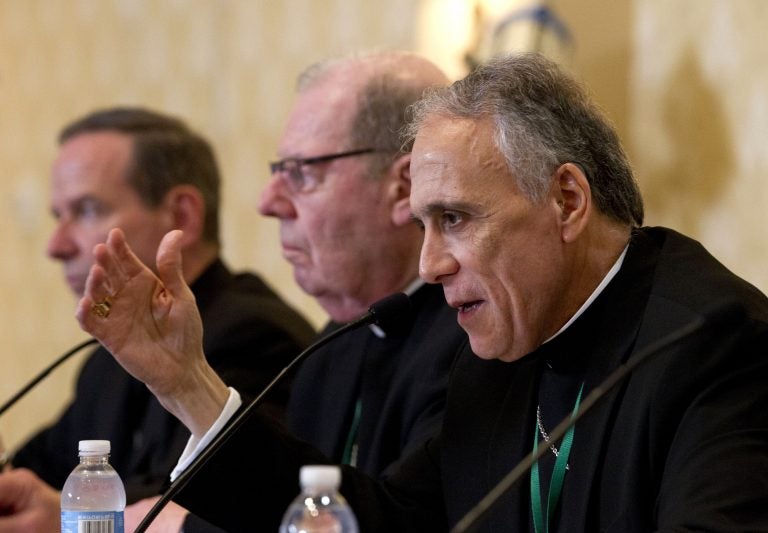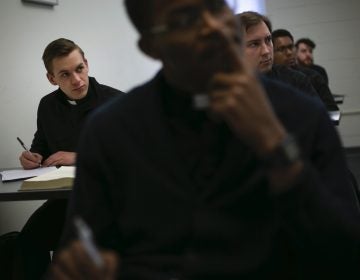U.S. Catholic Bishops approve measures to police themselves
The U.S. Conference of Catholic Bishops voted to implement several measures following last year's sweeping Pa. grand jury report on clergy sex abuse.

Cardinal Daniel DiNardo of the Archdiocese of Galveston-Houston, and president of the United States Conference of Catholic Bishops (USCCB), speaks during a news conference at the United States Conference of Catholic Bishops (USCCB), 2019 Spring meetings in Baltimore, Md.,Tuesday, Jun 11, 2019. (Jose Luis Magana/AP Photo)
The U.S. Conference of Catholic Bishops voted Thursday to implement new measures to increase the accountability of its members, following last year’s sweeping Pennsylvania grand jury report and recent scandals involving the misuse of funds by bishops.
The grand jury report specifically addressed the role of church leaders in enabling and covering up sexual abuse.
At the conference’s spring assembly, held this week in Baltimore, the bishops followed the recommendations of a recent edict by Pope Francis, which created worldwide rules for reporting sexual abuse within the Catholic church.
APPROVED!
(This Action item puts Pope Francis’s recent Motu proprio into practice in the United States.)#USCCB19
— US Catholic Bishops (@USCCB) June 13, 2019
That includes creating a structure for high-ranking bishops to investigate allegations against other bishops their area, known as the metropolitan model, after the designation given to the leader of the largest diocese in a geographic region. A bishop can also strip his predecessor of responsibilities in retirement if allegations against him later emerge.
“The fact that they’re even debating policing themselves, I’m not going to deny is a big step forward for victims,” said Shaun Dougherty, a survivor of sexual abuse by a priest in the Altoona-Johnstown Diocese, who attended the conference. However, he expressed skepticism in that they would be able to do so without the mandatory involvement of civil authorities.
The bishops also voted Wednesday to create an independently run sexual abuse reporting hotline.
The hotline, which would field allegations that bishops committed abuse or covered it up, would take complaints by phone and through an online link. It’s supposed to be operating within a year.
Hotline operators would relay allegations to regional supervisory bishops. Church leaders are encouraging those bishops — though not requiring them — to seek help from lay experts in assessing and investigating allegations.
As approved Wednesday, the hotline proposal does not spell out how the new system would interact with law enforcement.
“There can’t be half-measures. Anything shy of reporting to the police is a half-measure,” said Dougherty.
Dougherty, who said he met privately with Cardinal Daniel Dinardo, of Houston, said he urged for more specific relief for vicitms in Pennsylvania, including the establishment of “wellness centers” to support the mental health needs of sexual abuse survivors, and for the chuch to support the passage of “window” legislation, which would make it easier to sue over decades-old abuse claims.
The abuse crisis has prompted many parishioners in the U.S. to reduce their donations and attendance at Mass.
A national survey released Tuesday by the Pew Research Center illustrates the extent of the disenchantment. The March poll found about one-fourth of Catholics saying they had scaled back Mass attendance and reduced donations because of the abuse crisis, and only 36% said U.S. bishops had done a good or excellent job in responding.
According to the Center for Applied Research in the Apostolate, an authoritative source of Catholic-related data, 45% of U.S. Catholics attended Mass at least once a month in 2018, down from 57% in 1990.
At a press conference Thursday, Cardinal Joseph Tobin, of Newark, answered a question about whether the bishops had trouble focusing on ways to root out sexual abuse over the work of spreading the Catholic faith.
“One of the terrible costs of the scandal … is costing people their faith. And what a devastating example of collateral damage. So I think it’s entirely right that we give priority to this,” he said.
The Associated Press contributed to this report.
WHYY is your source for fact-based, in-depth journalism and information. As a nonprofit organization, we rely on financial support from readers like you. Please give today.



